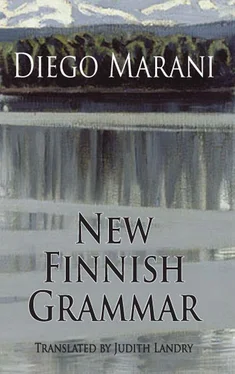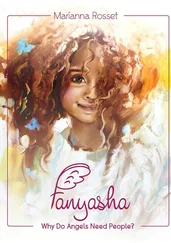‘What lovely voices!’ I said, nodding in the direction of her fellow-singers.
‘Thank you! You’re very kind. But then we’re singing such lovely music!’ she answered. I noticed that she was looking around uneasily, in search of some safe spot to rest her gaze. When they met mine, her eyes veered nervously away, like those of some startled creature. I too was peering around me, wondering how I might put her at her ease. Because, by now, I wanted her to stay; I would have liked to drive off her discomfiture with my bare hands.
‘It is so good to sing: your lungs fill up with air, your blood runs faster, even your brain works better. That is how sad music becomes joyful music,’ I said lumberingly, tripping over every word. But I was not sure that she had understood, because I often get mixed up between surullinen and iloinen ’ — sad and joyful.
‘Singing is the most natural form of music; and the oldest!’ she said distantly. I thought back to my lonely nights in Trieste, when I would repeat verses from songs I’d heard in the bars, quite without understanding them — just to have some words, any words, going through my head, anything to stave off the exhausting coming and going of my thoughts. Now I had a potential associate, someone to get to know, a friendship to nurture. But shaking off the crusty embrace of solitude entailed an effort.
‘Do you sing?’ she asked, taking heart.
‘Yes, but only as children do, to pluck up courage when I am afraid.’
‘And when are you afraid?’
‘Often. Above all when I am alone, when there is too much silence. I’m always afraid that it will last forever.’
My words made her smile; clearly, they struck a chord. So as to have something to do with her hands, she had begun fiddling with one corner of her cap, rolling it up and watching it unroll.
‘Silence is music too. At school, our singing teacher used to say that silence in music is like white in a water-colour; it’s not a colour, but you need it in a painting. Silence is what is left around the patches of colour, and every painting … ‘
I kept my eyes on her, but I was not seeing her. My thoughts were chasing one another pointlessly, never catching one another up. Her voice trailed away, and she looked at me doubtfully, ill-at-ease again.
‘Perhaps what I am saying is too complicated? I’m sorry … You express yourself so well, I quite forget …’
‘No, no,’ I broke in, ‘don’t worry, I understand. Not everything, but enough. And when I don’t understand, I myself make up what I want to hear!’
Then she laughed, and the sound was like a match struck in the dark room of my memory. I had the feeling I was remembering an identical laugh; but it was only a feeling.
‘I like the image your singing teacher used,’ I went on. ‘Who knows, perhaps we could play pictures like symphonies, only we just don’t know it!’
‘You use words nicely, too,’ she said. ‘Now that you know it better, what is it that you most like about our language?’
‘What do I like about it most?’
‘Yes. A word, a phrase …’
‘Well, I know this may strike you as strange, but what I like is the abessive!’ I answered hesitantly.
‘The abessive? But that’s a case, a declension!’ she shot back in amusement.
‘Yes, a declension for things we haven’t got: koskenkorvatta, toivatta , no koskenkorva , no hope, both are declined in the abessive. It’s beautiful, it’s like poetry! And also very useful, because there are more things we haven’t got than that we have. All the best words in this world should be declined in the abessive!’
She burst out laughing, holding one hand in front of her mouth; but it was no good, because her amusement had spread to her eyes. I savoured the success of my witticism, felt a pleasant sense of warmth stealing over me.
I glanced out of the window. The journalists who were not staying in the Kämp were beginning to take their leave; I watched them setting off over the snow, shrouded in the white mist of their own breath, talking loudly and swinging their arms in order to keep warm. At that hour I too would usually be returning to the hospital: to my cold and empty room.
‘What’s the matter?’ she asked in alarm, noting my sudden change of mood.
‘Nothing, nothing,’ I reassured her, shaking my head. ‘We were talking about music!’
She looked relieved.
‘Oh yes, music. What sort of music do you like most?’
‘Well, I’m no expert — I don’t go for anything difficult. Of the songs that you have just sung, I liked the last one very much.’
‘The Porilaisten marssi? Pojat kansan urhokkaan? But that’s a military march!’
‘That’s as may be. Anyway, the audience enjoyed it — it’s cheerful.’
‘The music maybe, but not the words!’ She was amused, and was still rolling her cap up into ever larger curls.
‘What are they about?’
‘About the homeland, about blood and those who are prepared to die,’ she explained gravely.
‘Will you teach it me?’
‘Well, there are more cheerful ones!’ she protested.
‘But that’s the one I want!’ I insisted. ‘If you speak slowly, I could copy out the words.’ I pointed to the notebook in my pocket, adding: ‘I’ll learn it by heart and then I’ll be able to sing it when there’s too much silence.’
She smiled; now I even saw a touch of tenderness in her eyes. She let her cap fall on her knee and placed her outspread hands upon the table; she clearly bit her nails.
‘Just as you like!’ she said, nodding in assent and looking around her, as though to check that no one was looking.
‘I don’t even know your name,’ I said, opening up my notebook.
‘Ilma,’ she said in a low voice. ‘It means air,’ she added.
‘Air?’ I repeated, amused.
‘Yes, like what you breath; or indeed what the weather is like.’ Once again she clenched her hands, so as to hide her fingers.
‘So when the weather is bad, could you say that today it’s bad Ilma?’
Clearly, no one had ever put it quite like that before.
‘Why not?’ she said, in some surprise. ‘But, above all, the name Ilma means freedom. Because it lets you free to be what you are, to go where you want: free as air. That’s what my father used to tell me. People called Eeva or Helena or Noora share their name with lots of others, so there’s something stale about it; but Ilma is always new, always pure.’
The meaning of this last sentence escaped me. I had watched it emerging from her mouth, followed the sound of it for a time. Then, without my realising, my eyes had ventured in the direction of her own. I felt the muscles of my face relax: everything in me was now letting go.
I copied out the words of the Porilaisten marssi , barely understanding them, as though they were the ingredients of some secret spell, and now they struck me as more magical than ever. Of all the words I’d written in that notebook, it was the ones which had made the soldiers cry that most intrigued me. That they had to do with war was plain as a pikestaff. Some of them were quite long, full of repeated vowels, with umlauts like helmets and aitches like slung arms. Others, much shorter, chopped off by apostrophes, seemed to be waving their stumps in the direction of the empty line. Certain capital letters referred to places where famous battles had taken place, although I could not recognize them. I saw the word for flag, and it did indeed seem to flutter, making a snapping sound as it left one’s lips.
‘Now you must sing it!’ suggested Ilma, suddenly warming to her task, elbows on the table, hands awkwardly intertwined.
‘I would like you to sing it with me,’ I said, overcome with shyness.
Читать дальше












